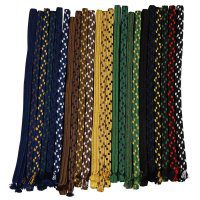Gun laws are an important part of legislation in every country. They have a major influence on conditions in every country. A typical counter-example to Japan and Germany is the situation in the USA, a country with very relaxed gun laws.
Weapons law in Japan
Japan, on the other hand, has very strict gun laws. The origin of the strict laws lies in the country's history. Even in the days of the samurai, the population was regularly disarmed by various rulers in so-called "sword hunts". Later, under the American occupation after the Second World War, the civilian population was not allowed to own weapons. Since then, the rules for Japanese citizens have remained strict, reflecting the fundamentally pacifist orientation of the country and its population.
Weapons are not widespread in Japan, which is why gun violence is very rare in Japan. The nation was shocked when, in 2022, the then Prime Minister Shinzō Abe was attacked and killed with a homemade firearm.
In contrast to the previously mentioned example of America, there are hardly any such incidents in the country. Although it is mainly the poor sections of the population who shoot each other in the USA, there have been numerous events in the country's history in which politicians have been murdered or injured by gun violence. From Abraham Lincoln to John F. Kennedy to the most recent attack on Donald Trump.
Are samurai swords allowed in Japan?
As an important part of Japanese culture, samurai swords are generally permitted in Japan. This includes all samurai swords such as tachi, katana, wakizashi and tanto, but also weapons such as naginata and yari. These are legal, but each sword must be registered with a local weapons authority. The authority issues a document for registration, which is numbered and must be kept together with the registered sword.
Sharp swords that are not registered are illegal weapons.
When exporting from Swords from Japan the Japanese registration is cancelled. Legal export is only possible for registered swords that are not categorised as particularly important historical cultural assets.
Special specifications for newly manufactured swords
Newly manufactured swords must also be registered in Japan. A number of requirements must be met for this. In order to be registered, a sword must have been made in Japan by a blacksmith who has a licence to make swords. The sword must be made using traditional methods.
Training swords (Iaito) in accordance with Japanese weapons law
Swords with a blunt blade made of a zinc-aluminium alloy do not have to be registered. They can be manufactured and sold without regulation. Possession is legal without additional requirements. The blade does not retain its sharpness and is not considered dangerous under Japanese law.
This is why these swords are the standard in Japanese martial arts.
The remaining components of these Japanese training swords are manufactured with the same care as real swords:
Iaito sword hilt
The quality of the handle is particularly noteworthy. Both the materials and the type of winding are of a high standard and time-consuming.
Iaito sword scabbard
To enable good training, the scabbard (saya) of Japanese training swords (iaito) is made to harmonise perfectly with the blade.
Weapons law in Germany
For years, German firearms legislation has sought to strike a balance between general protection for the country's inhabitants and regulated gun ownership. Special care is taken with firearms. These are comparatively strictly regulated, even in connection with hunting equipment. There are only a few exceptions, for example employees of security services are permitted to carry firearms under certain conditions.
The current status is much stricter laws than in the USA and regulations similar to those in Japan. Gun violence in Germany is also an exception.
Are samurai swords allowed in Germany?
The gun laws in Germany are suitably strict, at least with regard to swords, and provide a solid framework for the responsible handling of these sporting and collector's items.
In Germany, the purchase/possession of a sharp sword is permitted for legally competent persons over the age of 18. This puts the responsibility on a par with driving a car.
Registration, as in Japan, is not necessary for swords in Germany. A firearms licence or similar document is also not required to own a sword in Germany.
Training swords (Iaito) in accordance with German weapons legislation
Unfortunately, the laws in Germany are very vague when it comes to differentiating between real swords and training swords and can therefore be interpreted in different ways.
Unlike in Japan, Iaito are probably classified as weapons in Germany, despite the blunt aluminium blade, because of the sharp tip. This means that possession is only legal for legally competent persons of legal age and care must be taken to ensure that no minors have access to the swords.
In terms of transport, this means that the sword must actually be transported to the training location in a sealed container.
In our online shop we only sell Iaito to persons of legal age!
What happens to the sword afterwards is of course in the hands of the buyer. At least we are not aware of any case where a buyer has had problems because the sword was transported for training in an unsealed sword bag.
What will the next few years bring for Katana legislation in Germany?
In Germany, firearms legislation has been updated step by step over the last few decades and tightened with each new development. The current focus is primarily on restricting knives, which are widely used and are often used in criminal offences.
In recent years, however, there have been adjustments to German gun laws (which unfortunately have little potential for improving the security situation in the country).
With regard to swords, there have been hardly any changes in recent years, apart from adjustments to the wording in the law. These changes are desirable because they define more precisely what is permitted and what is not.
The reason for the few changes relating to swords is, on the one hand, the rare use in connection with criminal offences and, on the other hand, a very responsible community of sword owners in Germany. Sword buyers should be aware that with the ownership of a sword comes the responsibility to maintain this condition.
The laws are sufficient and work in practice. German legislation is therefore not expected to make any major restrictions on the possession of swords.
However, the members of the EU have standardised national legislation in recent years. There are numerous differences in weapons legislation within the EU. In some countries, swords are even completely banned, while in others only traditionally made swords are permitted.
What standardised legislation in this area could look like is therefore completely open.
Why Japanese gun laws are influencing martial arts training worldwide
The standard in the training of Japanese martial arts are Iaito manufactured in Japanas they are available in our shop. This standard influences martial arts training worldwide.
As described above, the swords are not completely free for sale in Germany, but are available from the age of 18. If the law changes in the future, training habits in Germany could also be significantly affected, because no adjustment of the training swords could be expected just because the laws in Germany have changed.
This means that Japanese weapons law and compliance with German legislation is the most important influencing factor for training with Japanese swords in Germany.





